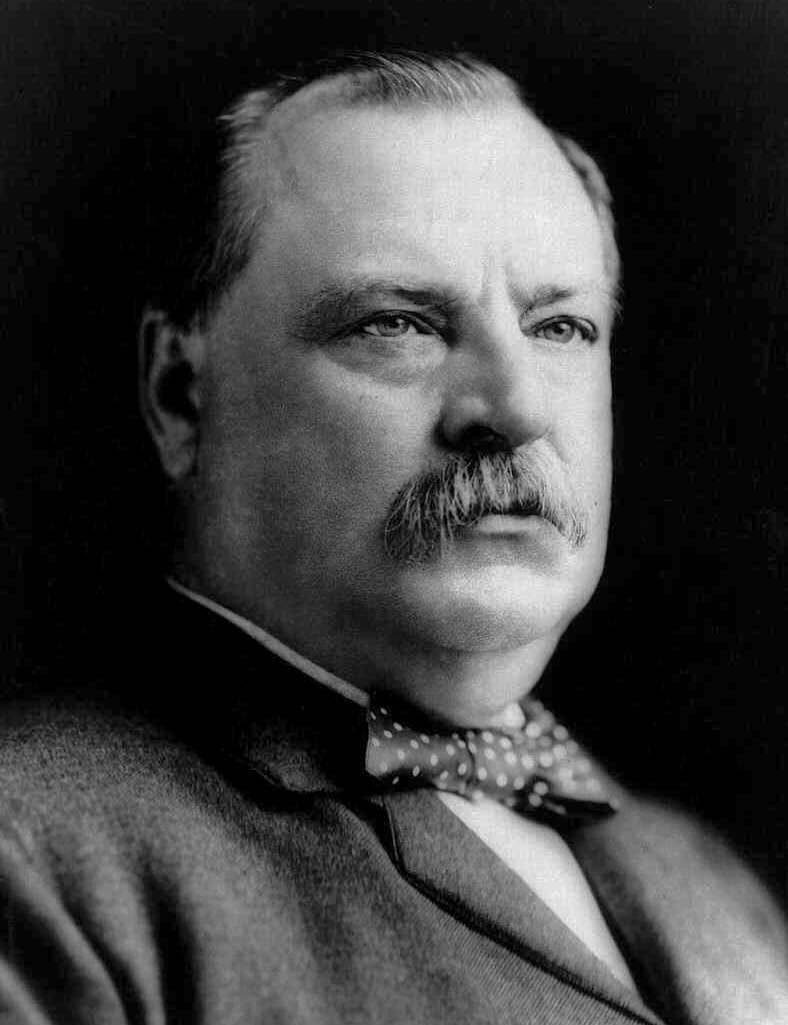Grover Cleveland
 Stephen Grover Cleveland (March 18, 1837June 24, 1908) was the 22nd and 24th president of the United States, serving from 1885 to 1889 and from 1893 to 1897. He was the first U.S. president to serve nonconsecutive terms and the first Democrat elected president after the Civil War.
Stephen Grover Cleveland (March 18, 1837June 24, 1908) was the 22nd and 24th president of the United States, serving from 1885 to 1889 and from 1893 to 1897. He was the first U.S. president to serve nonconsecutive terms and the first Democrat elected president after the Civil War.Born in Caldwell, New Jersey, Cleveland was elected mayor of Buffalo in 1881 and governor of New York in 1882. While governor, he closely cooperated with state assembly minority leader Theodore Roosevelt to pass reform measures, winning national attention. He led the Bourbon Democrats, a pro-business movement opposed to high tariffs, free silver, inflation, imperialism, and subsidies to businesses, farmers, or veterans. His crusade for political reform and fiscal conservatism made him an icon for American conservatives of the time. Cleveland also won praise for honesty, self-reliance, integrity, and commitment to classical liberalism. His fight against political corruption, patronage, and bossism convinced many like-minded Republicans, called "Mugwumps", to cross party lines and support him in the 1884 presidential election, which he narrowly won against Republican James G. Blaine.
During his first presidency, Cleveland signed the Interstate Commerce Act of 1887 which made the railroad industry the first industry subject to federal regulation by a regulatory body, and the Dawes Act, which subdivided Native American tribal communal landholdings into individual allotments. This policy led to Native Americans ceding control of about two-thirds of their land between 1887 and 1934. In the 1888 election, Cleveland won the popular vote but lost the electoral college and therefore the election. He returned to New York City and joined a law firm.
In the 1892 election, Cleveland won both the popular vote and electoral college, returning him to the White House. One month before his second presidency began, the Panic of 1893 sparked a severe national depression. An anti-imperialist, Cleveland opposed the push to annex Hawaii, launched an investigation into the 1893 coup against Queen Liliʻuokalani, and called for her restoration. Cleveland intervened in the 1894 Pullman Strike to keep the railroads moving, angering Illinois Democrats and labor unions nationwide; his support of the gold standard and opposition to free silver alienated the agrarian wing of the Democrats. Critics complained that Cleveland had little imagination and seemed overwhelmed by the nation's economic disasters—depressions and strikes—in his second term. Many voters blamed the Democrats, opening the way for a Republican landslide in 1894 and for the agrarian and free silver (silverite) seizure of the Democratic Party at the 1896 Democratic convention. By the end of his second term, he was severely unpopular, even among Democrats.
After leaving the White House, Cleveland served as a trustee of Princeton University. He joined the American Anti-Imperialist League in protest of the 1898 Spanish-American War. He died in 1908. Cleveland is typically ranked as an average or below-average U.S. president, due to his handling of the Panic of 1893 and the legacy of the Dawes Act. Provided by Wikipedia
